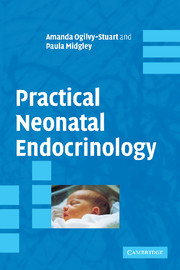Book contents
- Frontmatter
- Contents
- Acknowledgements
- Introduction
- 1 Hyperglycaemia
- 2 Hypoglycaemia
- 3 Management of hyperinsulinism
- 4 Hypoglycaemia in infant of a diabetic mother
- 5 Dysmorphic features
- 6 Micropenis
- 7 Hypopituitarism
- 8 Ambiguous genitalia (male): XY disorders of sex development
- 9 Cryptorchidism
- 10 Ambiguous genitalia (female): XX disorders of sex development
- 11 Pigmented scrotum
- 12 Adrenal failure
- 13 Collapse
- 14 Hypotension
- 15 Hyponatraemia
- 16 Hyperkalaemia
- 17 Hypernatraemia
- 18 Maternal steroid excess
- 19 Hypercalcaemia
- 20 Hypocalcaemia
- 21 Investigation and management of babies of mothers with thyroid disease
- 22 Maternal or familial thyroid disease
- 23 Goitre
- 24 Abnormal neonatal thyroid function tests
- 25 Hypothyroxinaemia in preterm infants
- Appendix 1 Calculation of glucose infusion rate
- Appendix 2 Dynamic tests
- Appendix 3 Normal ranges
- Appendix 4 Biochemistry samples
- Appendix 5 Formulary
- Index
21 - Investigation and management of babies of mothers with thyroid disease
Published online by Cambridge University Press: 15 February 2010
- Frontmatter
- Contents
- Acknowledgements
- Introduction
- 1 Hyperglycaemia
- 2 Hypoglycaemia
- 3 Management of hyperinsulinism
- 4 Hypoglycaemia in infant of a diabetic mother
- 5 Dysmorphic features
- 6 Micropenis
- 7 Hypopituitarism
- 8 Ambiguous genitalia (male): XY disorders of sex development
- 9 Cryptorchidism
- 10 Ambiguous genitalia (female): XX disorders of sex development
- 11 Pigmented scrotum
- 12 Adrenal failure
- 13 Collapse
- 14 Hypotension
- 15 Hyponatraemia
- 16 Hyperkalaemia
- 17 Hypernatraemia
- 18 Maternal steroid excess
- 19 Hypercalcaemia
- 20 Hypocalcaemia
- 21 Investigation and management of babies of mothers with thyroid disease
- 22 Maternal or familial thyroid disease
- 23 Goitre
- 24 Abnormal neonatal thyroid function tests
- 25 Hypothyroxinaemia in preterm infants
- Appendix 1 Calculation of glucose infusion rate
- Appendix 2 Dynamic tests
- Appendix 3 Normal ranges
- Appendix 4 Biochemistry samples
- Appendix 5 Formulary
- Index
Summary
Autoimmune thyroid disease in the mother may influence fetal thyroid function by transplacental passage of thyroid receptor immunoglobulins which may either block or stimulate the fetal thyroid-stimulating hormone (TSH) receptor. In addition, thionamides used in the treatment of thyrotoxicosis in the mother may cross the placenta and render the fetus hypothyroid.
Maternal hypothyroidism
This is usually secondary to Hashimoto's thyroiditis and the mother may be producing thyroid inhibiting or rarely thyroid stimulating antibodies so the baby may develop transient hypo or very rarely hyperthyroidism.
If the maternal TSH receptor antibody titre is known, the risk to the baby can be assessed. TSH receptor antibody titres do not differentiate stimulating from blocking antibodies and both may co-exist (high titres will increase risk of hypo or hyperthyroidism). The TRH receptor antibody results differ depending on laboratory methods, and so normal levels will need to be assessed with reference to the laboratory norms.
If maternal TSH receptor antibody titre is normal, a Guthrie card TSH will suffice.
If the TSH receptor antibody titre is elevated or unknown, review the baby at 10 days to 2 weeks and measure TSH and fT4.
As risk of postnatal hypo or hyperthyroidism in baby is small, some would advocate no investigations are required.
[…]
- Type
- Chapter
- Information
- Practical Neonatal Endocrinology , pp. 143 - 146Publisher: Cambridge University PressPrint publication year: 2006

